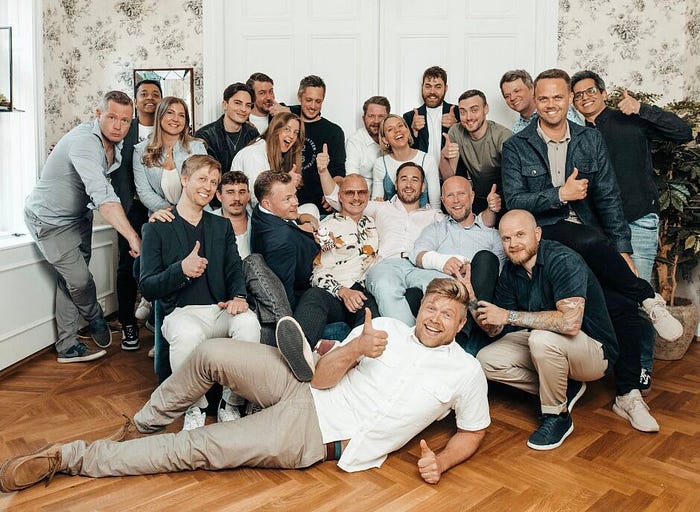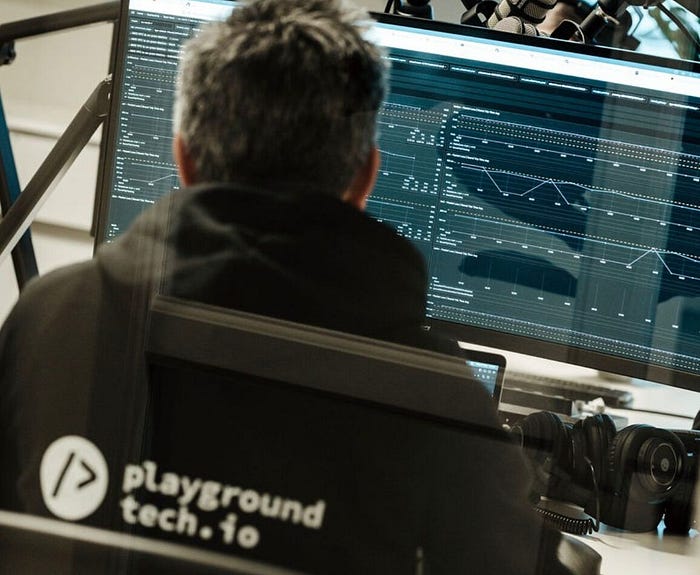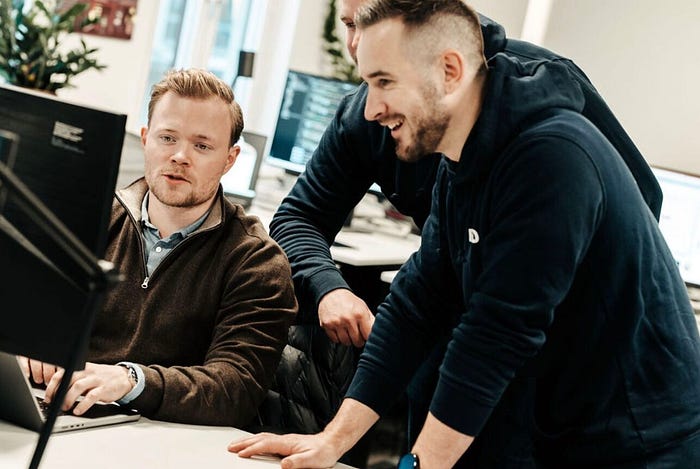Written by
Published on
August 31, 2024

Company growth is important, right? At Playground Tech, we don’t directly focus on growth; we have never done that. Yet we are quite good at growth, some of the best in the industry. How can this be?
Company growth is important, right? At Playground Tech, we don’t directly focus on growth; we have never done that. Yet we are quite good at growth, some of the best in the industry. How can this be?

Although we have operated since late 2018, our informal and untold principles have started to surface over the last year. These principles are not centrally governed or made up, I have just recreated them from our past and present actions; they are the sum of all co-workers’ personalities, quirks, and skills. These are our battle-tested principles that lead to inevitable growth on both an individual and company level.
It seems that we are indeed a growth company, or as a team, we have created and lived up to the conditions and standards that have created one hell of an unplanned but well-deserved growth journey. 🚀
Before you dive into the principles, feel free to revisit them regularly, reflect on them, steal them with pride, and make them your own. This is an open-source layer-8 (human layer — between the keyboard and the back of the chair) project we maintain and share.
At Playground, we measure ourselves and our actions against these principles, regardless of your role, responsibility, or background. These are our principles and baseline. We cannot back away from them and can only improve from here.
There are two principle types: the operational ones, which describe how we act, communicate, and stay productive. Then, there are the core principles, which are the heart and soul of the company and our raison d’être. They are as indisputable as laws of nature.
Why are the operating principles so important? Well, it’s that foundation in how we act, communicate, and collaborate daily where we get the actual work done.
These principles are common sense, easy to talk about, and hard to consistently live up to. We know that there is always room for learning and improvement. Remember, regardless of industry, they all lead to inevitable growth for you, your team, and your customers.

…for creative freedom, increased differentiation, and reduced competition.
We don’t go with the flow; we are unconventional in everything from recruitment to sales, marketing, and all technical deliveries.
We are uninterested in traditional approaches and expected results but interested in finding new ways forward when we create customer value.
This leads to perceived/real differentiation, less competition from a customer perspective, creative freedom, and increased confidence for us as a team.
This is our way of being brave, breaking the established rules for the sake of our customers and the long-term attractiveness of our company and each co-worker on the job market.
In my opinion, the most interesting companies ignore rules and establish new ones that eventually become the norm. Skype (telephony), Spotify (music), Klarna (retail banking), and Mojang (gaming) are examples of Swedish companies that have gone against the establishment on a global level and succeeded. Be proud and inspired by them. 🇸🇪 👏
What about us? We are a boring technical consulting and managed services company with embedded superpowers inspired by fast-moving and scalable tech businesses. Our timing in the public cloud paradigm shift is excellent, and we focus on our customer’s most important, time-consuming, boring, and fundamental needs. Our services are not nice to have; they are a must-have for navigating through a tough technical paradigm shift from physical data centers to the public clouds.
If we continue in this direction, we will eventually become a cloud on the cloud, which delivers the promise of the public clouds… We are serious about this. 😂
…and minimize the time from failure to success.
Everything we do has a built-in urgency and momentum. Our default mode is GO —with speed and quality. We choose both because we can. We clearly understand our goals and priorities, allowing us to work on the most important things right now and be confident in doing that until we are done.
We make decisions quickly and return to square one as quickly as possible if we fail. At square one, it is easy to recalibrate and move forward again with speed and quality, reducing the blast radius for failure.
This leads to quick results and good conditions for us all to do a great job. This boosts motivation and makes everyone good at failing and learning.
Q: Are you good at failing? If not, you should step out of your comfort zone more often; that is where you become friends with failures. Learning from them and celebrating them is a good way of removing the fear of failure. I hope you fail often.
…without egos and personal agendas.
We always work for what is best for our customers and Playground.
Engagement with perspective means not getting caught up in predetermined outcomes and being responsive and open to alternatives, new information, or knowledge. It’s not always easy, but it’s necessary.
It is necessary to always make long-term decisions that are best for our customers. In other terms, always let the best idea win! This applies to everyone at Playground, regardless of title, role, and responsibility. Because our job is to make the customer shine. ⭐️

This leads to the fact that we often create the best solutions for the customer and that you, as a team member, can quickly change your opinion and priority. Mastering this is being genuinely inclusive.
…for maximum productivity and talent growth.
Buzy work, make-work, playing office or so-called paper-pushing activities kill productivity, scare away talent, and make it difficult to get the real job done. Here are some examples of the worst type of busywork; if you are guilty or a victim of any of the examples below, please contribute to reducing or eliminating it immediately. ☝️
Here we go. The top-five-list of busy-work:
#5: Spending time answering unimportant emails.
#4: Wait for a decision due to cumbersome decision-making processes.
#3: Follow cumbersome and time-consuming processes.
#2: Excessive reporting, creating reports that no one reads or reading reports that don’t provide new insights.
#1: The unchallenged winner is long meetings without a clear agenda, with too many participants, where everyone can have an opinion, but only some folks want to or can make decisions.
At Playground, you are expected to use your and others’ time with great care and presence and a high focus on the actual work. Busy work is thus easy to identify and minimize.
This leads to a high focus on prioritized work and a sense that you are working on what is most important and can do this until it is finished.
… in human and technical interaction.
Arrogant complexity, how fun does that sound to you? Not very. But it’s one of the main reasons customers come to us from other suppliers. They experience an arrogant complexity from established players in the market.
We practice humble simplicity; don’t confuse this with modesty or not contributing to progress and change.
On the contrary, this attitude allows us to be straight to the point and always push things forward. It’s easy to be honest when you’re nice and driven by a good cause.
Simplicity can be found in the few moving parts of our organizational structure, decision-making, and technical design, coding, and customer onboarding process.

… Have fun, and take your job but not yourself seriously.
We all know the type who takes themselves too seriously at work, and they are often the same people who are good at busy work… Hanging out in long “important” meetings, having tons of opinions and little interest in decision-making or forward progress, replying to emails, or desperately trying to make sense of all reports sent his or her way. That is not how we roll.
At Playground, we don’t take ourselves seriously, but we take our jobs very seriously. The atmosphere is positive, despite the demanding job, or maybe just because of it.
As an employee, you are part of a group of good people with the same conditions and goals, regardless of age, gender, ethnicity, or background. We hang out at least 40 hours a week, and having fun together is a prerequisite for our collaboration and getting things done with speed and quality.
Personal and company growth is tough, so life needs to be easy. 🙏
This leads to an unpretentious work environment with plenty of room for humor, feedback, learning, and honesty. Again, it’s genuinely inclusive.
These are the soul of the company and our raison d’être. They are as indisputable as laws of nature, they are non-negotiable. ❤️🔥
… What’s your best-before date?
We are very persistent in developing the company. We do not hold positions; we always move forward with speed and quality.
Playground was initially a consulting company aiming to create cohesive customer value far beyond the non-scalable revenue stream skills by the hour.
Today, we are a product and managed services company with a consultancy capability. The money ticks in around the clock, all year round, over several stable income streams. The stuff we develop and deliver is the financial engine behind our growth.
We have learned that ideas and creativity start somewhere on a small scale. We have become good at scaling up technical ideas that are financially sustainable. Ideas that address our customers’ most important challenges.
We are always looking ahead to stay ahead of the development curve in our industry, and we look only in the rear-view mirror when we need to understand and improve the process of a successful outcome.
If we don’t develop our company or ourselves, our best-before date will approach rapidly; one day, we will be outdated and out of business. 😑
Problems → Challenges → Opportunities → Solutions!
Growth is just efficient, consistent problem-solving over a long period of time. We’re good at identifying and defining problems. But, yes, you guessed it… We don’t talk about problems without formulating the path towards a solution in the same breath. This is a growth mindset life hack.
I see us today as an efficient problem-solving machine. We agree that problems make us stronger as individuals and as a company.
We almost celebrate the emergence of problems, just like failures, because we know that when a shitstorm of problems approaches, we will have an opportunity to work hard together, get better, and learn something new.

…in a contagious learning and performing culture where basic human needs are met.
Everything starts and ends with people, regardless of the company. There are two types of people: co-workers and customers. My most important responsibility when operating a company in rapid growth is to ensure that everyone is happy but not completely satisfied because there should always be room for improvement in everything and everyone.
Every person wants to do a good job, contribute and develop. These are people’s basic needs in working life. There are no bad customers or co-workers, only bad conditions and leadership. If something is messed up or subpar in what we deliver, it all points back to me and the lack of clarity and conditions I, as a leader, have failed to create.
At Playground, we invest a lot of time, money, and commitment in creating good development opportunities for all co-workers. Becoming a part of Playground means jumping on a technical and personal development journey that sometimes feels like a rollercoaster. 🎢 😅
This journey is not always easy; it’s challenging and necessary to contribute and do great work at Playground and for your future attractiveness on the job market. Everyone at Playground is expected to stand with at least one foot outside their comfort zone. We do it together, and you are never alone.
This leads to a cause/effect relationship between the realized conditions and results, which creates a contagious learning and performance culture in the company.
Q: Every company leader should ask themselves if investing in their co-worker’s personal development and conditions to do a good job is expensive. Is the answer yes? Ask yourself how expensive it will be in the long run if your co-workers stop developing, can’t do great work, and stay with the company. 🤯 📉

…the effect of small, conscious, and consistent actions over time.
Principle 10, our X-factor, is the interconnected principle that cuts through people, processes, and technology like magic. It is the consistent action.
To consistently take action is to consciously go the extra mile everywhere, all the time, with our vision and customers as a starting point. Over time, the small, consistent, conscious actions have accumulated massive value for you, your team, and your customers.
In summary, growth is made possible from within. It is not an external goal we are striving for that seems to move further away the harder we want to achieve it. It grows through core principles and is made scalable in the operational principles of our everyday work life, where we do the actual work for our customers.
Our drive to take consistent action creates results, progress, meaning and order in our not always so planned, but well-deserved growth journey.
This means we and you (when you practice and apply these principles) overestimate what we can achieve in one year but vastly underestimate what we have achieved as a team over a five-year period.